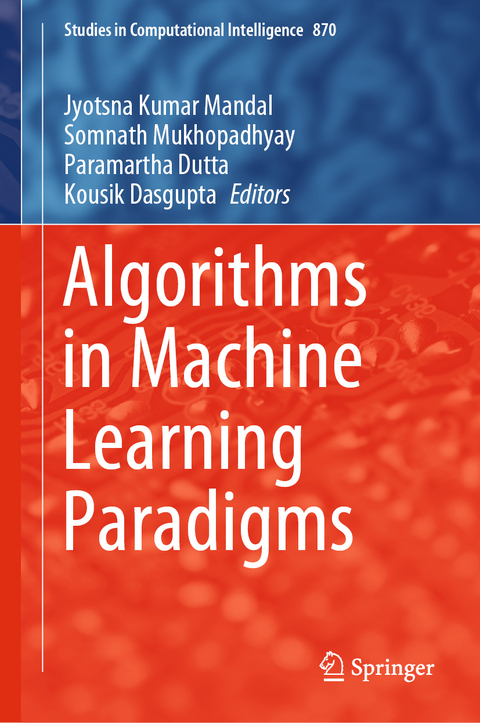
Algorithms in Machine Learning Paradigms
Springer Verlag, Singapore
978-981-15-1040-3 (ISBN)
Dr. Jyotsna Kumar Mandal is a Professor of Computer Science & Engineering, and former Dean of FETM, Kalyani University, India. He holds an M.Sc. in Physics from Jadavpur University, M. Tech. in Computer Science from the University of Calcutta, and was awarded a Ph.D. in Computer Science & Engineering by Jadavpur University. He has 32 years of teaching and research experience in various fields of computer science and allied areas, and has published 170 articles in journals, more than 300 articles at conferences, and edited 31 volumes and seven books. He is a Fellow of IETE, life member of CRSI and CSI, and senior member of IEEE. Dr. Somnath Mukhopadhyay is an Assistant Professor at the Department of Computer Science and Engineering, Assam University, Silchar, India. He completed his M.Tech. and Ph.D. degrees in Computer Science and Engineering at the University of Kalyani, India. He has co-authored one book and edited six books and published over 25 papers in various international journals and conference proceedings, including three chapters in edited volumes. His research interests include remote sensing and computational intelligence. He is a life member of the Computer Society of India and currently the Regional Student Coordinator of Region II, Computer Society of India. Prof. (Dr.) Paramartha Dutta, FIE (India), FIETE, FOSI, SMIEEE, SMACM, SMCSI, completed his bachelor’s and master’s in Statistics and Master of Technology in Computer Science at the Indian Statistical Institute, and his Ph.D. in Engineering at the Bengal Engineering and Science University, Shibpur. He has co-authored eight books and twelve edited books, and published 250 papers in various peer-reviewed journals and conference proceedings as well as several book chapters. He holds six international and eleven national patents. Dr. Dutta received (i) IRDP Lifetime Achievement Award 2018, (ii) Distinguished Scientist Award in Computer Science and Engineering 2018 conferred by the Venus International Research Foundation, (iii) Excellence in Science and Technology Award 2018 – 2019 conferred by the Indian Science Congress Association, Government of India, and (iv) INSA Teacher Award 2019 conferred by the Indian National Science Academy, Government of India. Dr. Kousik Dasgupta is an Assistant Professor of Computer Science & Engineering, Kalyani Government Engineering College, West Bengal. He completed his B.Tech. in Electronics and Power Engineering at Nagpur University in 1993, M.Tech. in Computer Science at West Bengal University of Technology in 2007, and his Ph.D. at the Department of Computer Science and Engineering, University of Kalyani, in 2017. Dr. Dasgupta has presented numerous papers at various conferences and co-authored several books. He is a member of five scientific and professional societies.
Chapter 1. Development of Trapezoidal Hesitant-Intuitionistic Fuzzy Prioritized Operators based on Einstein Operations with their Application to Multi-Criteria Group Decision Making.- Chapter 2. Graph-based Information-Theoretic Approach for Unsupervised Feature Selection.- Chapter 3. Fact based Expert System for supplier selection with ERP data.- Chapter 4. Handling Seasonal Pattern and Prediction using Fuzzy Time Series Model.- Chapter 5. Automatic Classification of Fruits and Vegetables: A Texture-based Approach.- Chapter 6. Deep Learning based Early Sign Detection Model for Proliferative Diabetic Retinopathy in Neovascularization at the Disc.- Chapter 7. A Linear Regression Based Resource Utilization Prediction Policy For Live Migration in Cloud Computing.- Chapter 8. Tracking changing human emotions from facial image sequence by landmark triangulation: A incircle-circumcircle duo approach.- Chapter 9. Recognizing Human Emotions from Facial Images by Landmark Triangulation: ACombined Circumcenter-Incenter-Centroid Trio Feature Based Method.- Chapter 10. Stable neighbor nodes prediction with multivariate analysis in mobile ad hoc network using RNN model.- Chapter 11. A New Approach for Optimizing Initial Parameters of Lorenz Attractor and its application in PRNG.
| Erscheinungsdatum | 17.01.2020 |
|---|---|
| Reihe/Serie | Studies in Computational Intelligence ; 870 |
| Zusatzinfo | 69 Illustrations, color; 46 Illustrations, black and white; X, 195 p. 115 illus., 69 illus. in color. |
| Verlagsort | Singapore |
| Sprache | englisch |
| Maße | 155 x 235 mm |
| Themenwelt | Informatik ► Grafik / Design ► Digitale Bildverarbeitung |
| Informatik ► Theorie / Studium ► Künstliche Intelligenz / Robotik | |
| Mathematik / Informatik ► Mathematik ► Angewandte Mathematik | |
| Technik | |
| ISBN-10 | 981-15-1040-7 / 9811510407 |
| ISBN-13 | 978-981-15-1040-3 / 9789811510403 |
| Zustand | Neuware |
| Informationen gemäß Produktsicherheitsverordnung (GPSR) | |
| Haben Sie eine Frage zum Produkt? |
aus dem Bereich


